The Chartered Institute of Taxation (CIOT) has today announced changes to the Chartered Tax Adviser (CTA) examinations to ensure that the CTA continues to be as relevant as possible to the needs of tax professionals.1
The changes follow an 18 month review which involved discussions with representatives of all the Institute’s major stakeholders.
The purpose of the CTA examination is to establish that candidates are capable of giving the very high standard of taxation advice expected of a Chartered Tax Adviser. This involves evidencing knowledge of a wide range of tax issues and demonstrating, in areas of tax chosen by them, in-depth competence and the ability to give concise and relevant written advice which is comprehensive, technically correct and commercially sound.
Significant changes to the CTA as a result of the review include:
· Confirmation of Eligibility will be abolished, effectively making it possible for the qualification of CTA to become a primary qualification. Students will no longer have to be exam qualified with another Professional Body in order to sit the CTA examination (although we will very strongly encourage candidates without prior tax knowledge to do the ATT CTA Tax Pathway).
· Abolishing the credit currently available, to a fairly large number of candidates from sitting the Application paper. Specific rules will apply to students on the Joint Programme.
· The introduction of an exemption from sitting the Awareness paper for certain candidates.
· The introduction of a Principles of Accounting paper which will be a one hour computer based examination. There will be the ability to apply for an exemption from sitting this paper.
· An increase in the period for which credits apply following the passing of a paper, from five to seven sittings.
· The amalgamation of the Advisory papers, Advanced Corporation Tax and Taxation of Major Corporates. The amalgamated paper will be available to those students doing the qualification by the traditional route and by those on the Joint Programme. In operation from the May 2018 examinations.
· Minor changes to the syllabi of the Advisory papers.
· The splitting of the Application and Interaction paper which currently incorporates Taxation of Individuals, IHT, Trusts and Estates into two separate questions:
– Taxation of Individuals
– IHT, Trusts and Estates
• Abolishing the Awareness module on Environmental Taxes, Excise Duties and Stamp Taxes. Removal from the examination of a number of the minor Environmental taxes from the syllabus. All indirect taxes remaining examinable will be included in the syllabi of the two Indirect Tax Advisory papers.
Transitional provisions for existing students will be in place to ensure that the changes will be as straightforward as possible and will not unfairly disadvantage any student.
John Preston, CIOT President, said:
“The Institute’s exams are fundamental to our role as the leading professional body dealing solely with taxation. They are intended to be challenging and all members deserve to feel proud of our accomplishment in passing them. At the same time, the demands on tax professionals, wherever they work, continue to develop. Accordingly, we must ensure our exams continue to test the skills required of today’s tax professional.
“We last updated our exam syllabus and structure in 2009, so a comprehensive review has been conducted, led with extraordinary dedication by former President John Beattie. The exams will remain as challenging as they are today, requiring candidates to demonstrate both breadth and depth in their tax knowledge, and the grading just as rigorous. We want to continue to see CTAs that can provide concise and relevant tax advice to clients, that is comprehensive, technically correct and commercially sound.”
Notes for editors
1. Extensive information about the changes to the CTA examination are available on the CIOT website from today (Wednesday). In-depth descriptions and explanations of the changes can be found at www.tax.org.uk/RevisedCTA
2. The Chartered Institute of Taxation (CIOT)
The CIOT is the leading professional body in the United Kingdom concerned solely with taxation. The CIOT is an educational charity, promoting education and study of the administration and practice of taxation. One of our key aims is to work for a better, more efficient, tax system for all affected by it – taxpayers, their advisers and the authorities. The CIOT’s work covers all aspects of taxation, including direct and indirect taxes and duties. Through our Low Incomes Tax Reform Group (LITRG), the CIOT has a particular focus on improving the tax system, including tax credits and benefits, for the unrepresented taxpayer.
The CIOT draws on our members’ experience in private practice, commerce and industry, government and academia to improve tax administration and propose and explain how tax policy objectives can most effectively be achieved. We also link to, and draw on, similar leading professional tax bodies in other countries. The CIOT’s comments and recommendations on tax issues are made in line with our charitable objectives: we are politically neutral in our work.
The CIOT’s 18,000 members have the practising title of ‘Chartered Tax Adviser’ and the designatory letters ‘CTA’, to represent the leading tax qualification.
Contact: Hamant Verma, External Relations Officer, 020 7340 2702 hverma@ciot.org.uk (Out of hours contact: George Crozier, 07740 477 374





-01.png)